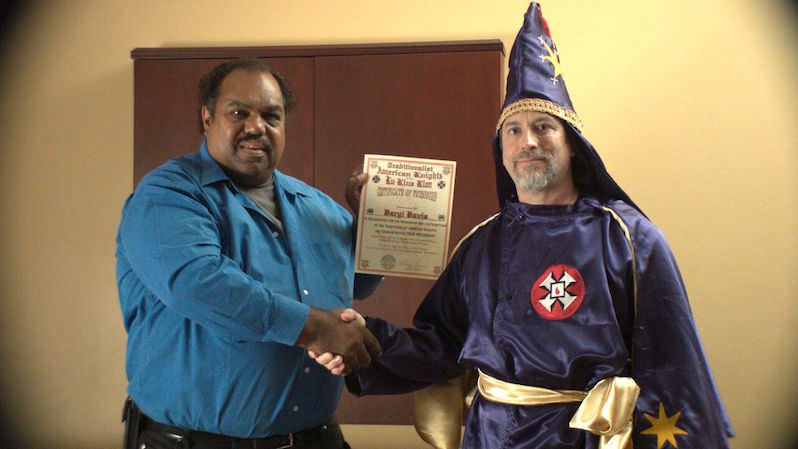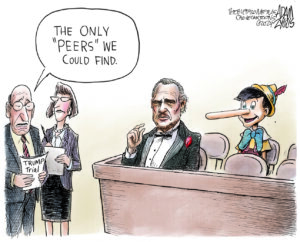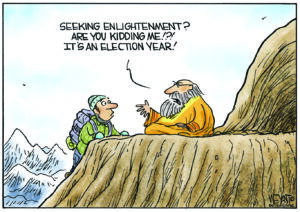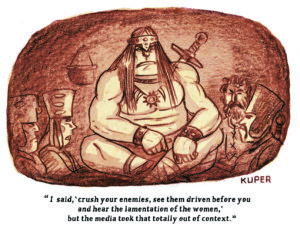In ‘Accidental Courtesy,’ a Black Musician Strikes Up Conversations to Confront White Supremacy
A new documentary follows pianist Daryl Davis as the simple act of engaging in conversation with an adversary takes on transformative potential. Though he claims more than two dozen converts, Davis’ methods have stirred up their share of controversy.
Daryl Davis, left, with a member of the Ku Klux Klan in this still image from the documentary “Accidental Courtesy: Daryl Davis, Race & America.” (AccidentalCourtesy.com)
Daryl Davis is a piano player who has shared the stage with Chuck Berry, Jerry Lee Lewis and Bruce Hornsby. These days, you’re as likely to find him playing a nightclub as you are dining with friends—like Ku Klux Klan Grand Giant Bob White, who honored the bluesman with a medallion reading, “KKK Member in Good Standing.” It’s not that Davis is racist; he’s a black man who believes in changing hearts and minds by sitting down and talking with those he disagrees with.
“There will be those who will die hating and being violent. And there are those who have changed,” Davis tells Truthdig about his failures and successes, as chronicled in the new documentary, “Accidental Courtesy: Daryl Davis, Race & America.” The film follows Davis and to Klansmen’s homes, as well as Confederate monuments, rallies, eateries and picnics. Success stories include Tina Puig, who divorced her white supremacist husband while he was serving time and married a black man. Imperial Wizard Roger Kelly is a prominent convert, but Grand Giant Bob White remains a holdout.
Former Tennessee Grand Dragon Scott Shepherd, who joined the Klan at age 17, left the organization in the 1990s; he turned over his robe to Davis when the two met three years ago. Davis will make the robe part of a “Museum of the Klan,” which he hopes to build after he adds more Klan paraphernalia to the roughly two dozen robes he’s collected so far.
Featured on CNN, in The Atlantic and The Washington Post, Davis’ direct, non-violent approach and bluesman persona is the kind of story that’s catnip for mainstream media. But outside the mainstream are those who have legitimate doubts about his methods, which have resulted in 26 converts since 1990. In the movie, poet Tariq Toure, Baltimore community activist, J.C. Faulk and Kwame Rose, who famously confronted Geraldo Rivera about FOX News’ one-sided coverage of the Baltimore uprising, engage in a heated exchange with Davis.
“You’re uneducated about the reality of people who look like you,” Rose tells Davis. “White supremacists can’t change.” In a separate sit-down, Faulk curses Davis out, calling him a “pimp in a pulpit.”
“Their point was that I was a sellout and I was wasting my time instead of trying to work with them and change the white supremacist system,” says Davis about the argument. “My thing is this, you can’t change a system. A system did not create itself. Until you change the attitude of men who built the system, the system is not going to change.”
“What they’re both saying is true,” offers the film’s director, Matthew Ornstein. “What Daryl is saying about when he makes an enemy a friend, he defeats his enemy, I think is accurate. And I think what Tariq says about it being an economic matter is very hard to argue with as well.”
Davis’ ability to navigate between racial stereotypes may be on account of his unique education in international classrooms, living two years at a time wherever his father’s job in the State Department took him, with nine-month interstitials stateside. America’s particular brand of racism was not something he grew up with, but noticed that, unlike his overseas friends, his U.S.-based peers mainly went to segregated schools or forced-integrated schools. “Daryl’s upbringing is like he was raised in the future, [a] super-multicultural environment,” explains Ornstein. “Unlike a lot of people raised under favorable circumstances, he tries his best to use it for a wider advantage than just himself.”
While Davis blames Rose and others for fueling rage in the African-American community during the Baltimore uprising, he is more concerned with white fear stemming from diminishing wages, fewer job opportunities and growing minority populations. When Obama was elected, recruitment numbers among racist groups spiked, as did hate crimes, according to studies done by the Southern Poverty Law Center and Anti-Defamation League.
“Now Donald Trump comes along and he’s campaigning on the very thing that white supremacist neo-Nazis have been preaching for decades: ‘We need to get all non-whites out of this country. Get rid of the Muslims, get rid of the Mexicans, stop immigration,’ ” says Davis. “Now here comes a white guy who’s speaking their language and he becomes elected to the most powerful position in the country. They feel emboldened to come out of the closet, from under the rock, even giving parades in Donald Trump’s honor in full robe and hood.”
While the rise of white supremacy under Trump is troubling, Davis finds it easier to battle overt racism than the unconscious bias that pervades all walks of life. And even as the gap between black and white widens, he will continue doing what he’s been doing—winning over converts one at a time. “This country, when it comes to solving our own issues, we tend to be more reactive than proactive,” he concludes. “Once we figure out there’s a problem, then we set aside five to 10 years to conduct a study. Black people have been here 400 years. How much longer do we have to be studied?”
Independent journalism is under threat and overshadowed by heavily funded mainstream media.
You can help level the playing field. Become a member.
Your tax-deductible contribution keeps us digging beneath the headlines to give you thought-provoking, investigative reporting and analysis that unearths what's really happening- without compromise.
Give today to support our courageous, independent journalists.






You need to be a supporter to comment.
There are currently no responses to this article.
Be the first to respond.